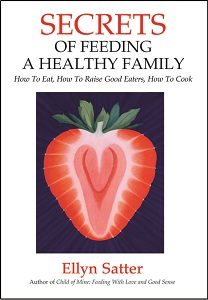

Family Meals Focus
The Ellyn Satter Institute Newsletter
Size acceptance
by Ellyn Satter, Registered Dietitian and Family Therapist
Whatever your size, work with your body rather than against it. Eat well and joyfully, and trust your internal regulators to guide you in what and how much to eat. Move your body in ways that you enjoy and can sustain. Then let your body weigh what it will in response to your positive and consistent eating and activity. Develop loyalty and respect for your body, and stop postponing living until you get thin.
How the Satter Eating Competence Model (ecSatter) addresses weight
In Session 3 of the Satter Eating Competence Model course, “Working with poor food acceptance and poor food regulation,” Clio is back for another roleplay. In my previous intervention, I blessed the food, was firm about structure, and encouraged her to find her own successes. She says meals are going great. However, “I have talked with you a number of times, and you have never said anything about my weight.” I told her I hadn’t said anything because I didn’t think it was an issue. But is it? “Well, not for me. I come from a long line of larger women, and I am okay with myself. But you see it everywhere, and when I go to the doctor they make comments. And they talk abut my kids. I am worried that because I am heavy my kids are going to be, too.”
Genetics lets people get fat; it doesn’t make them fat
First, a word about “fat.” It is descriptive, not mocking or shaming. It means having a relatively large amount of fat on your body. “Fat” does not judge like the words “obesity and “overweight,” which are medical terms that mean unhealthy. As I was saying to Clio, “There is no doubt that if fatness runs in your family it is likely to be easier for your children to get fat. It doesn’t make them fat. Concern yourself not with keeping them thin, but with doing all you can to let them get the bodies that are right for them.” Food security is the bottom line for Clio’s children with respect to letting them eat as much as they need and grow in the way that is right for them. Giving them regular meals and snacks, and not trying to restrict their food intake, reassures them that they will be fed.
Stable weight is healthy weight
Clio says her weight as an adult has been stable. She gained some weight with her pregnancies, but since then her weight has stayed about the same. It went down a bit when she started having meals, but then it leveled off. I told her that trying to get her weight down could end up making her weight go up. Striving for weight loss would likely make her food-preoccupied and prone to overeat. If she is a typical dieter, she would have stepwise weight gain: regaining to a higher level each times she loses. Clio is a good regulator, and it isn’t wise to interfere with that: Her weight was stable when her eating pattern was grab-and-go, and it is stable with structure. Interfering with her body’s regulatory system could permanently disrupt the balance.
People who are Eating Competent do better with weight
In helping people to be Eating Competent, we encourage, “Feed Yourself Faithfully,” “Give yourself permission to eat.” Despite fears that such giddy self-indulgence will lead to health and nutritional disaster, people with high Eating Competence actually do better. They eat a more nutritious diet and their weights are about the same as the general population. They are not thin and in fact many would qualify for the so-called “overweight” or “obese” category. At the same time, they are medically healthy.1 Striving for weight loss takes the joyful, relaxed eating of Eating Competence all away.2 Rather than trusting yourself to eat food you enjoy in amounts you find satisfying, you have to go without or force yourself to eat “slimming” foods.
For more help with becoming eating competent, see Ellyn Satter’s Secrets of Feeding a Healthy Family.
References
- Lohse, B., et al., Measuring Eating Competence: psychometric properties and validity of the ecSatter Inventory. J Nutr Educ Behav, 2007. 39 (suppl): p. S154-S166.
- Krall, J.S. and B. Lohse, Interviews with low-income Pennsylvanians verify a need to enhance eating competence. J Am Diet Assoc, 2009. 109: p. 468-473.
Explore
Ellyn Satter’s Secrets of Feeding a Healthy Family says the secret of raising a healthy eater is to love good food, enjoy eating, and share that love and enjoyment with your child. When the joy goes out of eating, nutrition suffers.

